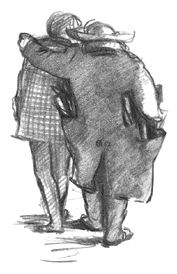Vie de Boheme

(8 of 24)
How the Bohemian Club was Founded
The young man was about to answer, when a dragoon acting as an orderly came into the yard. “M. Bernard?” he enquired, pulling a letter from a big leather despatch-case dangling from his hip.
“This is where he lives,” said the janitor.
“Here’s a letter for him. Give me the receipt for it.” The dragoon handed the janitor an official form, which the latter took into his lodge to sign.
“Excuse me for leaving you,” the janitor said to the young man, who was striding impatiently about the yard. “This is a letter from the Ministry to M. Bernard, the landlord, and I’m taking it up to him.”
When the janitor entered his apartment, M. Bernard was trimming his beard.
“What do you want, Durand?”
“There’s an orderly here, sir,” said the janitor, taking off his cap, “who’s brought this for you. It’s from the Ministry.” He handed M. Bernard the letter. Its envelope was stamped with the seal of the War Department.
“Goodness gracious!” said M. Bernard, so excited that he almost gashed himself with his razor. “It’s from the Ministry! It must be my nomination to the rank of Chevalier of the Legion of Honour, that I’ve been after for so long. At last my correct attitude has been appreciated … Wait, Durand,” he said, rummaging in his waistcoat pocket, “here are five francs to drink my health. Ah no, I haven’t my purse on me. You shall have it immediately, just wait a moment.”
The janitor was so moved by this staggering access of generosity, to which the landlord had not accustomed him, that he put his cap back on his head. But M. Bernard, who at other times would have passed severe strictures on this infraction of the laws of social hierarchy, seemed not to notice it. He put on his spectacles, broke the envelope with the respectful emotion of a vizier receiving a firman from his sultan, and began to read the despatch. At the first lines a horrible grimace streaked the fat of his monkish jowls with crimson furrows, and his little eyes shot out
sparks which almost set alight the locks of his tousled wig. Soon all his features were so convulsed that his face looked as it had suffered an earthquake.
To be continued …
[Vie de Bohème by Henry Mürger, a vivid portrait of the ‘Bohemian’ life of the artistic quarter of
Leave a Response
You must be logged in to post a comment.

